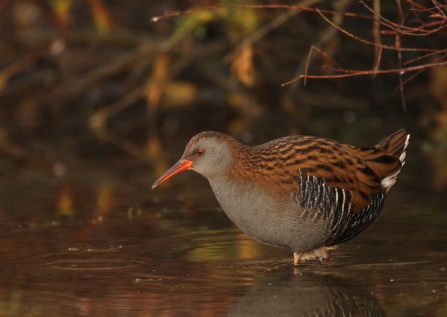Old Sludge Beds
Know before you go
Dogs
When to visit
Opening times
Open at all timesBest time to visit
All year roundAbout the reserve
We probably could have come up with a better name for this often over-looked nature reserve! But the 'Old Sludge Beds' does at least hint at the history behind the place.
Ash dieback
The disease ash dieback is now widespread in the UK and is present at many of our nature reserves, so we carry out tree felling across our sites in winter months. For your own safety please observe temporary path diversions and closures.
Where possible we will leave affected ash trees in place to decay naturally as an important habitat for wildlife. We plan to only fell diseased ash trees which pose a threat to people or infrastructure. Before trees are felled, we will check whether any rare or protected wildlife is present. If it is, we will postpone or avoid felling these trees. No felling will take place during the bird nesting season.
DWT’s Saving Devon’s Treescapes project are working with communities, landowners and businesses to help make Devon's precious treescapes more resilient in the face of ash dieback. Find out how you can get involved here.
NOTICE: If you are visiting our reserves, please note that there have been instances of H5N1 Avian bird flu found in birds in Devon. There is very low risk to public health, but we do ask that if you come across any unusual or unexplained bird deaths on or near our reserves, please do not touch them and avoid allowing your dog to come into contact with dead birds. Please report them to Defra here or call 03459 335577 and also report your findings to DWT by email at contactus@devonwildlifetrust.org.
Habitat
Contact us
Environmental designation
Location map
How to get to Old Sludge Beds
This site was once the resting place for much of Exeter's treated sewage. However, in 1969 the job of cleaning up after the city came to rest with the South West Water plant which sits next door.
Today the Old Sludge Beds is an altogether more welcoming place to wildlife and people.

Water rail. Photo, Sherie New
Don't miss out
Despite this lots of visitors to the Exe Estuary and even many local people still miss out on its natural charms.
This is a shame because its boardwalks and paths bring you close to some interesting wildlife and provide good views of the neighbouring Exe Ship Canal.
Cetti's warbler. Photo, Sherie New
In spring and summer the reserve is an important place for migrating songbirds including Cetti's warblers.
Old Sludge Beds is also a great reserve for insect watching, with dragonflies offering some of the most spectacular action. Visit on a warm evening and you'll also be rewarded by the sight of bats looking to clutch a meal as they fly above the pathside reed beds and ponds.
In winter the pace of wildlife slows. Even so, the Old Sludge Beds can still offer the chance of seeing a bittern or a water rail skulking in the reeds.
Explore the Exe Valley from here
A trip to Old Sludge Beds can be combined with a visit to look over the nearby Exe Reed Beds nature reserve. For those wanting more, why not take the River Exe Wild Walk which links the reserve to Devon Wildlife Trust's Cricklepit Mill in the heart of historic Exeter?
Become a member and support our work
The vital work we do for nature depends on the support of people who care about the future of Devon’s wildlife and wild places.




